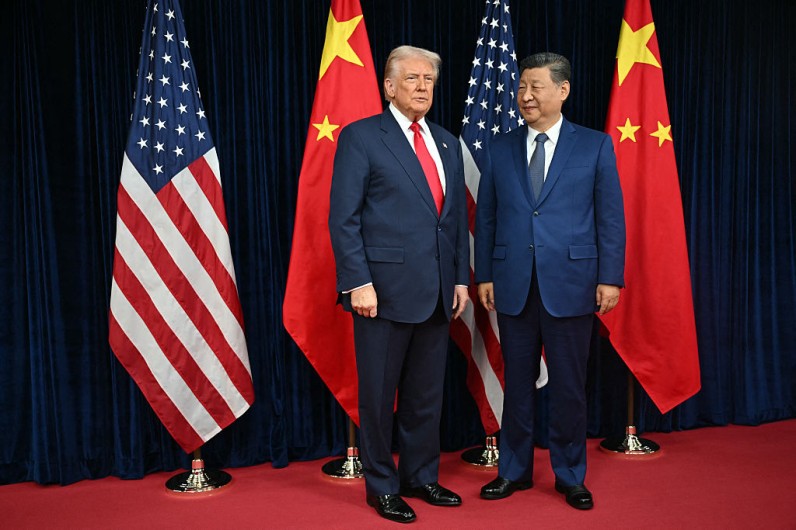
President Donald Trump and Chinese leader Xi Jinping met Thursday in Busan, South Korea, marking what both sides described as a major step toward stabilizing strained U.S.-China trade relations.
The two leaders agreed to reduce tariffs, resume agricultural trade, and reopen dialogue on advanced technology exports—signaling the first tangible thaw in years of escalating economic tension.
Trump announced that the United States will lower tariffs on Chinese imports from 57% to 47%, including a reduction on levies related to chemicals used in fentanyl production, Yahoo reported.
"I guess on the scale from 0 to 10, with ten being the best, I would say the meeting was a 12," Trump told reporters aboard Air Force One. "I think it was a 12."
In return, China agreed to lift restrictions on rare earth exports—materials crucial for technology and defense manufacturing—and resume purchasing American soybeans.
Trump said he expects to visit Beijing in April, with Xi planning a follow-up visit to Washington later in the year.
The nearly two-hour meeting took place ahead of the Asia-Pacific Economic Cooperation (APEC) summit, held in the nearby city of Gyeongju.
It was the first face-to-face meeting between the leaders since 2019, and it drew intense global attention as investors watched for signs of a breakthrough in the long-standing trade war.
Today President Trump flew to South Korea, was met at the airport by a band playing YMCA, was awarded the Grand Order of Mugunghwa - the highest honor in South Korea - and was given a magnificent gold crown. Yes, seriously.
— Whale Psychiatrist ™️ (@k_ovfefe2) October 29, 2025
Then he announced a new trade deal with South Korea and… pic.twitter.com/sCWHL7jMsn
Donald Trump, Xi Jinping Reach Short-Term Trade Truce
While both leaders struck an optimistic tone, sources close to the talks cautioned that deep divisions remain.
The US and China continue to compete for dominance in critical technologies like semiconductors and artificial intelligence, as well as in shaping global policy on conflicts such as Russia's war in Ukraine.
According to AP News, Xi, speaking through a translator, emphasized cooperation despite ongoing disagreements. "Given our different national conditions, we do not always see eye to eye," Xi said.
"It is normal for the two leading economies of the world to have frictions now and then."
For Trump, the tariff reduction represents an attempt to cool tensions while maintaining leverage in ongoing negotiations.
Earlier this month, he had threatened new 100% import taxes on Chinese goods—a move that spooked markets before being shelved in favor of Thursday's compromise.
Economic analysts say the meeting signals a temporary truce rather than a long-term fix. "Both sides are managing volatility, calibrating just enough cooperation to avert crisis," said Craig Singleton of the Foundation for Defense of Democracies.







Join the Conversation